English
Reading, writing and speaking and listening
Vision and Aims
At Prince of Wales, we firmly believe that the skills developed through our ambitious English curriculum are not just a platform from which our curriculum can be accessed and enjoyed, but are also invaluable tools to equip our students to access the world around them, communicate with others, advocate for themselves, decipher new information and be successful in their future endeavors in Secondary education and beyond. For this reason, Reading and Writing are always whole school priorities and our ambitions are to improve and maintain high standards of delivery, opportunity, progress and attainment for all. We want our pupils to leave us prepared for their next phase of education and to take with them a curiosity for the written and spoken word.
Teaching reading, including phonics
Our Reading curriculum is designed to ensure all children are able to become fluent readers, regardless of starting point, through rigorous phonics teaching, intervention and guided adult support and daily reading across the curriculum.
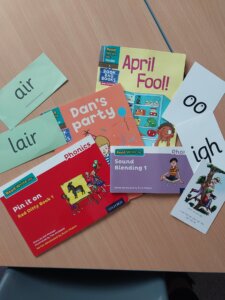
We follow the Read Write Inc. scheme for phonics and this is well embedded. In Nursery, our children are informally exposed to initial sounds through songs, rhymes and daily stories. From Reception, and into KS1, we deliver phonics in small, streamed groups to ensure children receive the direct teaching and practice that they need at an appropriate level and pace. Assessment happens regularly, but is also flexible based on individual progress. Once they reach the appropriate level, children take home their Storybook to continue to practice their fluency of sounds and blending. We also give our children additional Book bag books so that they can apply these familiar sounds to a new context and therefore build confidence and independence. We provide our families with bookmarks to help guide conversations around the books our children take home. This helps with understanding the story, characters and children begin to make inferences using what they know.
From year 2 onwards, children receive Daily Guided Reading sessions. These continue to focus on fluency but also give explicit teaching time to a range of skills and strategies to support effective comprehension of a variety of texts. As children move off the RWI program, they transfer to Accelerated Reader. Through this, our children are assessment termly and receive a reading range, within which, they can select a book that interests them. We encourage our children to take quizzes often, and as their accuracy improves, they move up through the levels. AR allows us to ensure children are reading a book which is matched to their confidence and current ability; we have a wide variety of books for children to choose from.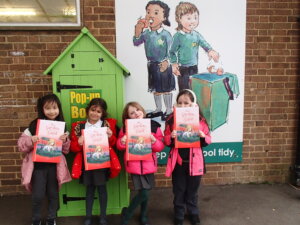
Reading for pleasure
Alongside our curriculum reading, there are lots of opportunities for reading for pleasure across the school.
Storytime happens regularly and is a valuable opportunity to expose our children to a variety of authors, genres and characters. Through stories, our children can hold up mirrors and see themselves, open windows and see into the lives of others, or push through doors and be inspired to try something new. In KS1, we have a Set list of books from our Windows, Mirrors and Doors collection to encourage children to respond empathetically to themselves, their peers and the world around them. Our book collection is diverse, and continually growing, to ensure all members of our school community can find something of themselves in the books that they read. In KS2, we also have our ‘POW Readers’. These are a selection of diverse, ambitious books assigned to each year group.

All classes have a designated reading area with books to suit pupil interests and AR levels.
We have a KS1 and KS2 library which children access fortnightly, as a minimum, and a Travelling library to introduce different books into the classroom.
World Book Day is a calendar highlight and gives us another opportunity to celebrate books, stories and reading.
Many of our Parent Café’s are also themed around books and reading and we hold Parent Forums throughout the year to share different ways to support your child at home.
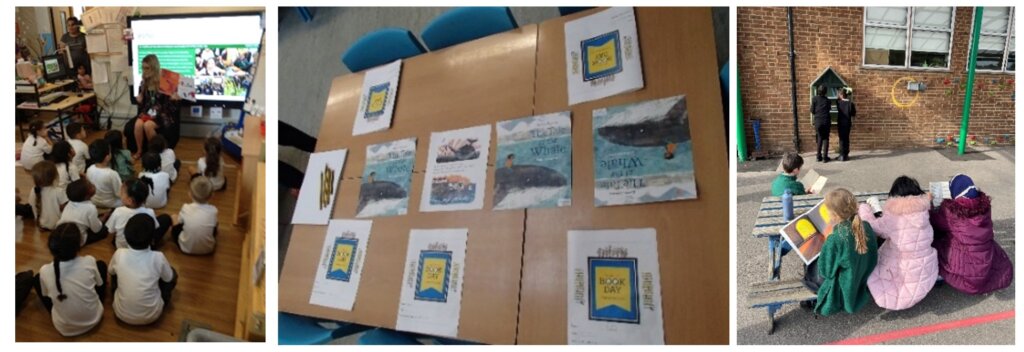
World Book Day 2021
Although we were at home for some of last year, we still managed to celebrate World Book Day in many different ways. We shared books on live links, wrote book recommendations, created story maps, made story boxes and some of us dressed up as our favourite book characters.
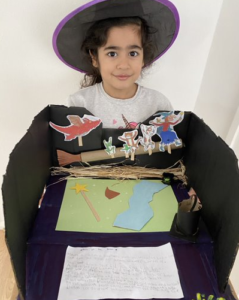
World Books Day 2021
Teaching writing
Our Writing curriculum is largely text driven, with a variety of styles and genres explored both as stimuli for creative writing and responses. Each year, our children have the opportunity to learn about different purposes for writing and are able to apply previous knowledge and skills to new contexts.
In EYFS, our focus is on immersion into stories and language. Our vocabulary rich environments and quality interactions ensure children see and hear good language at this crucial stage of development. Their language builds in the writing cycle, where children will often use role-play to retell stories. This gives their independent and guided writing a real focus and our children enjoy writing their ideas.
In KS1, we build on this writing for purpose. Children are engaged in writing texts such as narratives, instructions and begin to look at non-fiction styles of writing. Where possible, it links to real experiences, trips or other areas of the curriculum so that our pupils’ vocabulary is secure and used in context. In KS2, our pupils revisit the writing genres from KS1 but are introduced to additional writing genres (ie. Balanced arguments, scripts, more innovated narratives and more). All units begin with an immersive lesson to set the tone and purpose for writing. This is often something creative, but might also be outdoors or a visit/visitor. From this experience, our children are exposed to new vocabulary and have the chance to hear, say and play with words. At Prince of Wales, the writing journey and finding an author’s voice, is just as important as a ‘final’ piece. Therefore, our children have lots of opportunity to rehearse, discuss, plan, draft and then edit their writing. We also plan for additional writing opportunities in other curriculum areas for children to apply their writing skills to their wider knowledge.

Enrichment and trips
Throughout the year, our pupils have many opportunities to engage in workshops, trips and with visitors to enhance our English curriculum. In recent months and years, these have included, but are not limited to, the following:
- Shakespeare workshops
- A visiting pantomime each year based on a traditional tale
- Participating in Spelling Bee Competitions with the ETSP
- Participating in debating clubs and competitions with the ETSP
- Poetry and spoken word workshops with The Write to Speak and Zohab Zee Khan
- A visiting theatre production in the summer
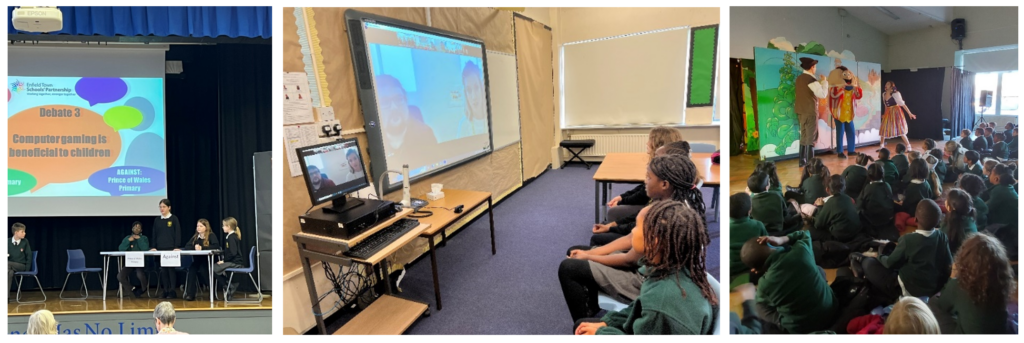
Teaching Reading, including phonics’
Accelerated Reading Workshop
Pupils from Year 2 upwards take home books from Accelerated Reading scheme. After taking a Star Reading Test they are given an accelerated reader level from which they must choose their books. Pupils take weekly quizzes, once they have read the book, which tests their comprehension. This encourages them to read for meaning and enjoyment. Scores are recorded and help the child and teacher to monitor progress. Pupils gradually extend their range of reading as they progress.


